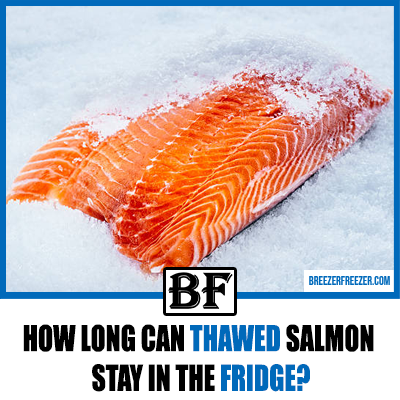How Long Can Thawed Salmon Stay in the Fridge?
The salmon market has surged recently, with $235 million in sales this year. But unlike meat products, Salmon and other fish are delicate and need to be handled with more care, especially when you are freezing salmon. There are many culinary suggestions for thawing and keeping salmon and even going from the freezer to the oven and cooking from frozen,

This article will answer many frequently asked questions enabling you to handle your salmon in the safest way producing a quality meal for you and your family.
Let’s get into it.
How long can you keep thawed salmon in the fridge?
Two days. Salmon and fish, in general, are delicate and need to be treated differently from other fleshy meats, it starts to turn bad quickly, and after two days, you may find yourself with salmon that is fit for the garbage bin, so eat the same quickly after thawing.
But not all salmon is made equal, so how about thawed smoked raw salmon? Does it have a longer shelf life after thawing?
There seems to be an anomaly; if you freeze and thaw smoked salmon, it loses some of its shelf life. Typically, the salmon will last two weeks in the fridge and only four days after thawing!
Why is the shelf life of thawed salmon so short? It’s not just thawed salmon. It’s salmon, in general.
Food safety and store times are critical for storing salmon, and if you are unaware, cold salmon can proliferate listeria bacteria super quick at low temperatures.
Is cooked salmon still good after three days in the refrigerator?
With major holidays around the corner, salmon sales will be shooting through the roof. It is a holiday favorite for a good reason. It’s delicious and filling and keeps you and your guests satisfied.
Inevitably the holidays roll by, and you open the fridge and spot the salmon, thinking, is that still ok to eat? It’s been there for three days. Should it be thrown away?
Cooked salmon in the fridge will last three days, so you can safely eat the salmon without worrying.
How long after defrosting salmon should it be cooked?
Three days. There is no middle ground with salmon. It’s either within the time limit for cooking or not; if it’s not, you can consider the salmon will make you sick.
Smoked salmon can stay in the fridge for up to two weeks, but it is ready for the garbage bin after two weeks.
Should you rinse salmon before cooking?
It seems like a good idea, but the USDA advises being cautious. Rinsing salmon, fish, and even poultry under the faucet is not without risks. When rinsing the salmon, water droplets will inevitably spray on your clothes, the countertops, and the faucet.
The bacteria attached to the water droplets is incredibly hard to kill, and not your food preparation area is contaminated.
Why should you never thaw frozen salmon in its vacuum-sealed packaging?
Vacuum packaging is great for meats and fish. It keeps the product together and prevents juices from contaminating work surfaces. But the advantages of vacuum-sealed packs end there.
If your salmon has not been stored correctly by the retailer and is not even appropriately thawed, the vacuum packaging can harbor deadly toxins.
Fish has a short shelf life due to its propensity to become contaminated with the bacteria Clostridium botulinum type E. This bacteria is a spore former that can grow at temperatures above 38ºF and without oxygen – such as a vacuum package.
Should you keep salmon in the freezer?
Freezing fresh raw salmon does extend the life of the fish markedly. Salmon in the freezer will have a life of around a year. It may be a little less for the salmon to be the best quality, but if you have 9 to 10 months and can eat quality salmon, it is a good idea to freeze it.
After twelve months in the freezer, you can expect the salmon to start losing some of its texture and flavor, a natural decay from freezing foods for a long time.
How should you store fresh salmon in the freezer?
Salmon does need some preparation for the freezer, and it’s worth spending a few minutes to ensure the salmon will remain a quality piece of fish when you decide to thaw and eat it.
Salmon has lots of moisture, so pat it dry with kitchen paper towels removing as much moisture as possible.
At this stage, you may wish to cut the salmon filet into portions for fast thawing and not to waste the fish. Place the salmon in zip-lock bags and then dispel as much air as possible from the bags. Place the zip lock bags in an airtight container, mark the date of freezing on the container and place the salmon in the freezer, which should be 0℉.
What’s the best way to thaw salmon?
In the fridge overnight. Let the salmon thaw naturally in a cold environment like the fridge. This will minimize bacteria proliferation.
Remove the salmon from the airtight container and zip lock bags, place a paper towel on a plate and rest the salmon there for even defrosting.
Thawing in the fridge requires planning, but it will be worth it.
Can you thaw salmon in cold water?
Yes, but it has to be cold water. Fill a bowl, add some ice cubes, and place that salmon in the bowl to thaw.
If the salmon is in its original packaging, remove it and place it in a zip-lock bag. Carefully expel the air from the bag, seal it and place the salmon in the water.
You can place the salmon under cold running water, but you should know that if the water is not around 40℉, you risk introducing bacteria to the salmon.
How long can raw salmon sit out?
Less than two hours. According to the FDA, cooked food is sitting out at room temperature, so it should only be on the countertop for a maximum of two hours before being considered too dangerous to eat due to bacterial exposure.
It would be reasonable to assume that raw salmon on a countertop at room temperature is a potentially hazardous practice and should be avoided.
Can you cook frozen salmon?
Yes. Some people swear by cooking frozen salmon and say it produces a splendid piece of well-cooked fish that is delicious.
While others say don’t do it for this reason, if you look at a filet of salmon, it tapers off. You may get two to three even-size portions from the center of the filet, and the other filets will vary, such as thin at one end and thick at the other.
While you can cook the evenly cut portions even;y the other filets will cook unevenly, rendering the salmon less appetizing.
It is also said that cooking thawed salmon produces a superior meal.
How long do you cook salmon from frozen?
There are no set guidelines due to the portion size, but as a guide, here is some information that will help you:
- Your oven will need to be hot before placing the salmon. Preheat your oven to 450℉.
- Remove the salmon from the packaging, ensuring there are no ice crystals. If there are ice crystals, place the salmon in a bowl of cold water until the ice has melted completely.
- Place the salmon on a rimmed baking tray in a single layer with no overlapping.
- Baking time will vary, but if you have a cooking thermometer, the thickest part of the salmon should reach an internal temperature of 145 degrees℉ to be considered cooked, according to the FDA.
Is frozen salmon healthy?
There is a misconception that frozen salmon is not as healthy as fresh salmon. This is wrong. Frozen salmon contains the exact same nutritional value as fresh.
Freezing does not deplete the salmon of any of its nutrients.
Why does frozen salmon taste different from fresh?
Unless you have line-caught your salmon yourself and eating fresh, the same-day frozen salmon should not taste any different. In many cases, frozen salmon has a superior taste to fresh salmon due to the fast flash-freezing process, which retains texture and flavor.
The fresh salmon on display in the store has been frozen and thawed for your convenience, but it’s certainly not better than frozen salmon.
How do you know if salmon is bad?
The Salmon should be bright pink.
The first sign will be the smell; salmon does not smell like fish. It should smell of the salty ocean where it was caught. If your salmon smells like fish, it is turning bad and should be discarded.
Old salmon loses its texture, becomes dry, often takes on a dull color, and even turns gray. It is pretty easy to spot salmon that is not edible.
If salmon has an overall unappetizing look, then don’t eat it. Salmon can have dark spots, which are bacteria and even mold, and a slimy surface coating.
Final thoughts.
Thawed salmon has a short shelf life in the fridge. After two days, it is potentially dangerous to eat and should be discarded.
The good news is salmon can stay in the freezer for up to a year and not lose its quality of texture or flavor, and you can cook salmon from frozen if you are careful.
Thaw salmon slowly in the fridge. This is the safest way to thaw the fish for texture and flavor.




